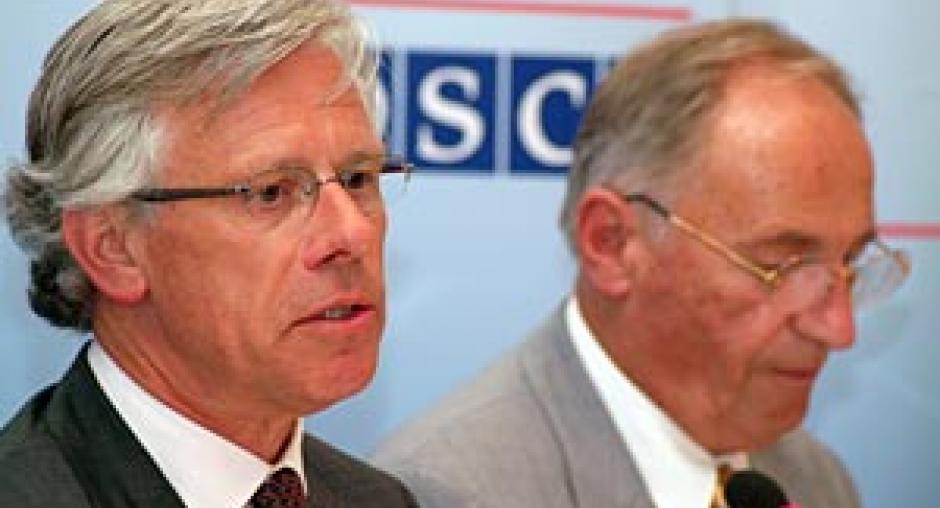OSCE countries examine reform recommendations of Panel of Eminent Persons

VIENNA, 30 June 2005 - The 55 States of the Organization for Security and Co-operation in Europe today began consideration of a report on improving the effectiveness of the Organization submitted by a Panel of Eminent Persons appointed by the Slovenian Chairmanship.
The 32-page report, entitled "Common Purpose: towards a more effective OSCE" was presented to the Permanent Council by the Head of the Slovenian Foreign Ministry's OSCE Task Force, Ambassador Boris Frlec.
It includes more than 70 recommendations to re-invigorate the world's largest regional security Organization, including re-defining the roles of its annually rotating Chairmanship and of the Secretary General and paying heads of field missions from the core budget rather than through secondment from their countries.
The report also suggests that participating States should devise an OSCE Charter setting out its basic goals, principles and commitments, and giving the Organization a legal personality that would at the same time improve the protection provided to staff in crisis areas.
"The Panel faced a demanding task," Ambassador Frlec said. "They had to provide the participating States with recommendations to reinvigorate the political dialogue and provide strategic vision for the Organization, as well as review the existing structures of the OSCE and assess their effectiveness.
"Knowing the challenges and the amount of work that had to be done in a rather short time, I am very pleased to say that they have not only met our expectations, but even surpassed them."
The seven-member Panel proposed that consensus decision-making should be retained, but suggested that blocking countries should be identified, instead of remaining anonymous as at present. On decisions concerning key appointments, States with national candidates should not unilaterally block consensus, it said.
"The report recognises the need for a stronger focus of OSCE activities," said the Chairman of the Panel, former Norwegian Foreign Minister Knut Vollebaek, who was OSCE Chairman-in-Office in 1999.
"At the same time, the Panel emphasises the need for a cross-dimensional approach in all of the OSCE's activities. The Panel recommends that a guiding principle should be to give priority to those areas where the OSCE can bring added value in relation to other organizations."
Ambassador Vollebaek said the Eminent Persons recommended a stronger and more visible role for the Secretary General.
"It is important for the OSCE to have the Secretary General as a focal point, with a long-term strategic vision, a role that retains the institutional memory and represents continuity."
"A stronger Secretary General does not imply a weakening of the Chairman-in-Office", he added. "The report stresses the important political role of the CiO in creating consensus in the Permanent Council and in handling urgent crises in the OSCE area."
The Panel also made suggestions for a radical reform in the employment practice affecting Heads and Deputy Heads of the 18 field missions that OSCE currently deploys.
"Field Operations have a unique role within the OSCE. They should be further strengthened. Thus, the Panel recommends that all be employed and paid from the core budget, not seconded from participating States. This is not a costly reform according to our assessment, adding only two per cent increase to the core budget. However, it would strengthen the institutional ties between the Field Operations and the rest of the Organization."
The report will form the basis of high-level consultations on the future of the OSCE in Vienna in September, leading to decisions by OSCE foreign ministers at their annual meeting in Ljubljana in December.
The other members of the Panel were Nikolay Afanasievsky (Russian Federation), who died just before the report was completed, Hans van den Broek (Netherlands), Wilhelm Hoeynck (Federal Republic of Germany), Kuanysh Sultanov (Republic of Kazakhstan), Richard S. Williamson (United States) and Miomir Zuzul (Republic of Croatia). Vladimir Shustov replaced Ambassador Afanasievsky for the last meeting.
